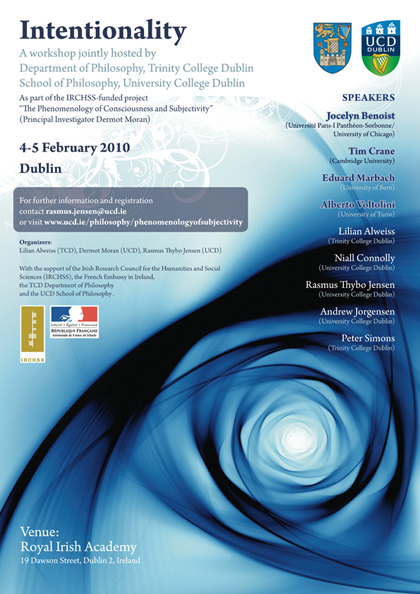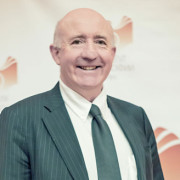Dermot Moran, Joseph Chair of Philosophy, Boston College, has published widely in medieval Christian philosophy (especially Christian Neoplatonism, including St. Augustine, John Scottus Eriugena, Anselm, Thomas Aquinas, Meister Eckhart and Nicholas of Cusa), contemporary European philosophy (especially phenomenology, including Husserl, Heidegger, Scheler, Stein, Schutz, Sartre and Merleau-Ponty), philosophy of mind and embodiment (themes of intentionality, consciousness, empathy, intersubjectivity and sociality), and on the history of twentieth-century philosophy (especially on the history of the analytic/Continental divide). He is currently researching the phenomenology of embodiment and the evolution of the concepts of self and personhood in Western philosophy (in dialogue with world cultures). He was President of the 24th World Congress of Philosophy in Beijing, 13-20 August 2018
Research
Interests
- Phenomenology (especially Husserl, Heidegger, Merleau-Ponty, Sartre)
- Medieval Philosophy (especially Christian Neoplatonism, John Scottus Eriugena, Meister Eckhart, Nicholas of Cusa)
- Philosophy of Mind and Cognitive Science (Intentionality, Consciousness, Embodiment, Empathy)
- Modern European Philosophy (Descartes, Kant, German Idealism)
- Relations Between Analytic and Continental Philosophy
- The History of Twentieth-Century Philosophy
- The Phenomenology of Selfhood and Personhood
Research Projects

Dermot Moran is Principal Investigator for the Irish Research Council of the Humanities and Social Sciences (IRCHSS) Advanced Collaborative Research Project Grant ‘Discovering the “We”: The Phenomenology of Sociality’., 2012-2013. (value: €119,099).

Dermot Moran has successfully completed an Irish Research Council for the Humanities and Social Sciences (IRCHSS) project ‘The Phenomenology of Consciousness and Subjectivity’(2008-2010).
Consciousness and subjectivity are central to lived human existence yet have been remarkably downplayed by objectivist and naturalistic tendencies in contemporary science. This project proposes to revision conceptually and to re-assess critically the enduring relevance of the phenomenological approach to consciousness, embodiment, and subjectivity, with regard to contemporary discussions of these issues in the philosophy of mind, cognitive sciences, and related human sciences. This contemporary re-conceptualisation of the phenomenological approach to consciousness and subjectivity, aims specifically to reinsert phenomenology into current, more naturalistic cognitive science discussions of these topics, and to present phenomenology in a rigorous manner, accessible not just to philosophers but also to those in the human sciences.
The project will construct a considered, robust and reasoned defence of the phenomenological approach against theoretical challenges and criticisms that emerge from contemporary more naturalistic approaches of the mind, consciousness and subjectivity, criticisms that often dismiss phenomenological findings as ‘merely’ subjective, introspective (hence unreliable) and not amenable to objective assessment or lawful generalisation. An informed theoretical clarification of phenomenology will potentially have a significant impact in the human sciences where theoretical concepts clustered around subjectivity, consciousness, and embodied selfhood are regularly deployed.

This international collaborative project investigates the role of responsibility and judgment in knowledge formation. Building on the work of the phenomenologists Edmund Husserl and Jan Patočka, the project will investigate the limits of formalist approaches to knowledge, arguing that such formalism depends on a problematic separation of knowledge-production from the life-world in which it is necessarily placed. The project will provide new insight into the work of Husserl and Patočka, while also bringing their concepts to bear on a range of contemporary questions concerning knowledge and its wider cultural and socio-political context.
This project will contribute to building Australia’s capacity in the area of phenomenology & connecting Australian researchers into the international network of phenomenology research. More generally the project will contribute to the broader community debate that is currently emerging around issues of the role & limits of knowledge, especially scientific knowledge, but also knowledge as it arises and is applied in organisational and social contexts, & the importance of responsibility and judgment even in areas of technical problem-solving & decision-making. In this latter respect, the project is likely to have an impact in more directly applied areas such as policy formation & decision-making across many different areas.

This project, funded by the Irish Research Council Senior Research Fellowship (2002-2003) provides a critical assessment of twentieth-century philosophy both in terms of its accomplishments and the problems it bequeaths to our current twenty-first century. In a number of recent publications, and focusing particularly on the theme of intentionality and the philosophy of mind, I have been emphasizing aspects of the contacts and continuities between the two major intellectual traditions or ‘styles’ of the last century, namely, analytic and Continental philosophy. These traditions are widely held to have developed separately, with opposing aspirations and methodologies, and, indeed, to be fundamentally hostile to one another. However, more careful scrutiny actually shows that these traditions emerge from common sources in nineteenth-century philosophy and address many of the same problematics, albeit with different emphases and modes of approach. I believe that, as the century begins to come into historical focus, it will be shown that the commonalities between the traditions are more significant that their opposition.
It is not widely recognised that the two most prominent twentieth-century movements, namely, analytic philosophy and phenomenology, both have their origins in a set of interrelated concerns, namely: the status of logic as a science (and its relation to mathematics); the nature and extent of the new science of psychology; and the challenge of naturalism to the traditional philosophical enterprise. These problematics are interrelated: John Stuart Mill and other prominent philosophers in the nineteenth century had explained logic in terms of psychology (so called ‘psychologism’). Frege and Husserl both rejected the explanation of logic in terms of psychology and strove to defend the independence of logical truths, although they parted company in terms of their evaluation of the form of the proposition and the role of mathematical formalisation in logic. Both Husserl and the Neo-Kantians were opposed to naturalism, and recent anti-naturalists have invoked many of the same arguments.
Very soon, problems with Gottlob Frege’s logicist project gave rise to the logical analysis of Bertrand Russell and the early Wittgenstein. Problems concerning the interrelation of logical concepts and their linguistic expression became central to the philosophies of Russell, the Vienna Circle and Wittgenstein. The so-called ‘linguistic turn’ in analytic philosophy also is paralleled in Continental philosophy, as Husserl’s focus on the life of consciousness gave way to the concern with language and interpretation found in the work of Heidegger, Gadamer, Derrida, and others. Phenomenology gave rise to hermeneutics and ultimately to deconstruction. In analytic philosophy, the confidence of the ordinary language philosophers was gradually eroded by recognition of the problems associated with radical translation, etc. I propose to track these themes as they develop and intersect across the twentieth century.
This project involves researching and writing a number of studies showing continuities between the work on analytic and Continental philosophers, e.g. in the area of intentionality (Brentano, Husserl, Chisholm, Dennett and Searle), and in the study of consciousness generally. Obviously, a key component of this research will be contact and collaboration with colleagues in the UK, Europe and the US.
As Principal Investigator I plan to bring together the results of my research in a series of articles, but one major result of this project will be a new book on twentieth-century philosophy, in collaboration with a team of international experts. This book was published by Routledge as The Routledge Companion to Twentieth Century Philosophy (2008).
